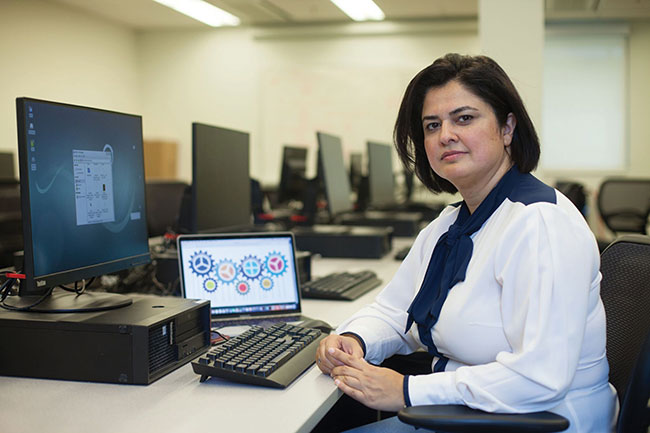
LRIC Update: Predicting the next pandemic
By Lilian Schaer
Features New TechnologyResearchers create avian influenza prediction system.
 University of Guelph researchers Rozita Dara (pictured here) and Shayan Sharif are building a decision support system for avian influenza.
PHOTo: University of Guelph
University of Guelph researchers Rozita Dara (pictured here) and Shayan Sharif are building a decision support system for avian influenza.
PHOTo: University of Guelph For Shayan Sharif, the next pandemic was always a question of when and not if. And the Associate Dean of Research and Graduate Studies at the Ontario Veterinary College and professor in the University of Guelph’s Department of Pathobiology was fairly certain the culprit would be an influenza virus of avian origin.
Since then, the world has been living through that next global pandemic, driven by SARS-COV2, the coronavirus that causes COVID-19. And Sharif is more convinced than ever of the need to be proactive and forward-thinking when it comes to pandemic preparedness and prevention – and of the risk pigs and poultry in particular pose as potential hosts for an influenza-driven pandemic.
“I never ever imagined a coronavirus pandemic of this magnitude could result in such a significant global response,” he says, adding that for some highly virulent avian influenza viruses transmitted to humans, the fatality rate could be 30 to 50 per cent of infected people, compared to COVID-19’s approximately one per cent.
And although the world has learned a lot through this pandemic, one thing Sharif believes hasn’t progressed is a general understanding of pandemics themselves – how, why, when and where they happen.
Boosting that understanding is what he says will help the world avoid or at least minimize the impacts of future pandemics, especially ones that affect both humans and livestock and could have much more catastrophic global impacts.
“If I were to put a coronavirus head-to-head with an influenza, hands down influenza is harder to control. Viruses are very sneaky and they know every single vulnerability in our systems and in our communities and how to exploit our immune systems to their own advantage,” he explains. “That’s why I’m concerned about future pandemics.”
He’s particularly worried about a livestock virus that could jump to humans and then back to livestock, wreaking havoc on people, their food sources and, in some cases, their livelihoods. And if it’s a virus with the capacity to cause greater mortality in younger populations, who also happen to make up the majority of the global workforce, that could have catastrophic impacts on society and the economy.
This was a leading reason why Sharif teamed up with Rozita Dara, associate professor and data strategy director at Guelph’s School of Computer Science, to create a Decision Support System (DSS) that uses data from various sources to predict when and where an avian influenza virus can emerge.
“We created a system that will have various components like social media posts, poultry farm density, regional climate and weather data, animal transportation and the flight paths of wild birds,” he says. “Using machine learning, we can pull all of this together and predict fairly accurately not only which regions are at risk of occurrence of outbreaks, but what decisions can help mitigate the impacts.”
Sharif and Dara’s pilot DSS system has taken advantage of the data from southeast Asia, where it has been tested for regional risk prediction of avian influenza outbreaks.
Now, the two scientists are seeking funding to determine what is needed for the Ontario and Canadian poultry industry and how to adapt the system for use here at home. That includes being able to collect and validate data used to assess and manage disease risk, for example.
They’re also seeking the expertise of organizations like the Feather Board Command Centre in Ontario, which plays a key role in foreign animal disease response for producers, and the Canadian Food Inspection Agency, which has federal jurisdiction over outbreak response.
To date, the DSS project has received funding support from the Canadian Poultry Research Council, Egg Farmers of Canada, the Ontario Ministry of Agriculture, Food and Rural Affairs, the Natural Sciences and Engineering Research Council and the University of Guelph’s Food From Thought project.
The system could also be adapted to other disease and species.
Livestock Research Innovation Corporation (LRIC) fosters research collaboration and drives innovation in the livestock and poultry industry. Visit www.livestockresearch.ca or follow @LivestockInnov on Twitter.
Print this page